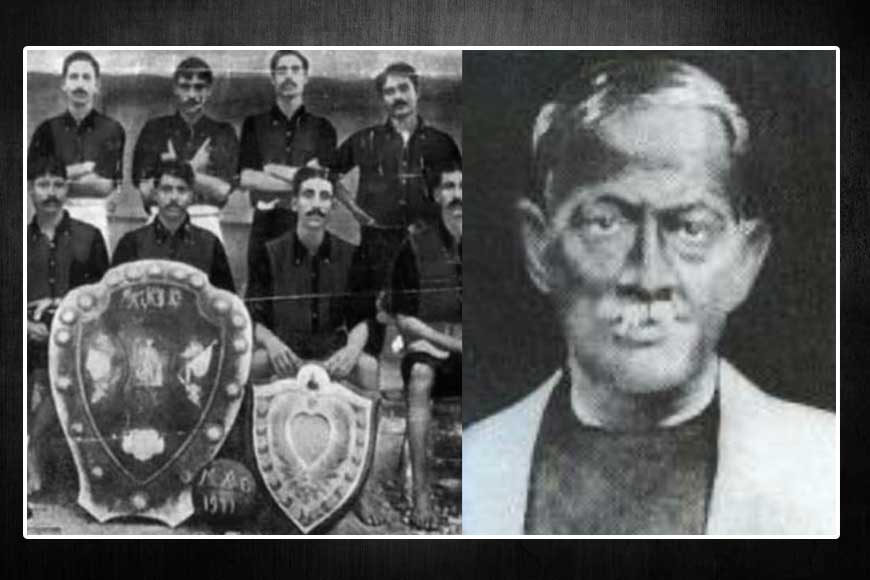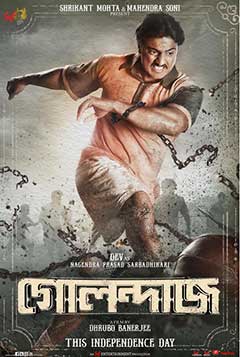'Golondaaj' is a new film based on the life of the 'Rockstar of Football’

It was the year of 1877 when a teenager on the sprawling grounds of Hare School was seen playing with his classmates a game of football. The European teachers were amazed at his skills and that of his young team and thus was born the first ever Indian initiative to build a football organization. The teenager was none other than Nagendra Prasad Sarbadhikari, known as Father of Indian Football. These days cine lovers of Kolkata are flooded with posters of a new movie Golondaaj based on the life of this ‘Rockstar of Football.’
But Nagendra’s life was not just about playing football, rather it was about popularizing the game in India as a nationalistic tool to fight the British. It was he who mobilized his classmates and started playing the game and thus his teachers entrusted him and his team to promote football among students in and around Calcutta. He thus founded The Boys’ Club, the first ever Indian football club. The phenomenal sports saga he started at the age of just 10-11, made Nagendra the Father of Indian Football, with the opening of a string of football clubs in erstwhile Calcutta. He also played a leading role in the creation of the Indian Football Association (IFA) in 1892.
Born on August 27 1869 in Kolkata into the renowned Sarbadhikari family originally hailing from Radhanagar (Khanakul) of Hooghly, Nagendra’s father was Brigadier Rai Bahadur Dr Surya Coomar Sarbadhikari, a surgeon who served during the Sepoy Mutiny. The family originated from 15th-century Sureshwar Basu’s family of Choa village of Murshidabad. The Sarbadhikari title was given to the family by the Imperial Court of Delhi.
P.L. Dutt in his book Memoir of Father of Indian Football remembers how most football matches held in 19th century Calcutta was among British soldiers, tradesmen and sailors. “Nagendra Prasad changed the scene. The very next day after he had been intrigued by the game at the Calcutta Maidan, Nagendra Prasad collected subscriptions, bought a ball from Messrs. Manton & Co., a renowned sports goods shop in Calcutta’s Bowbazar area, and mobilised his classmates at the Hare School to play a game. The motley group had no idea about the rules of the game and played a sport which could pass off as a hybrid form of football and rugby. However, their efforts attracted enough curiosity for a sizeable crowd to gather to watch the game. Among those following the game was G.A. Stack, a professor at the adjacent Presidency College, who watched the proceedings from the college balcony. It was Stack along with J.H. Gilligand, another professor at Presidency College, who were deeply moved by the enthusiasm of the boys and took it upon themselves to teach Nagendra Prasad and his companions the rules of the game. With proper guidance, Nagendra Prasad’s interest only kept growing — soon he went on to form the Boys Club.”
But Nagendra was not happy with just one football club. He wanted to make the game popular in Bengal and thus teamed up to form several other clubs which are probably precursors to the iconic ‘Maidan Football’ legacy that Calcutta is so proud of. His classmate Nagendra Mullick, of famous Mullick family of Chorebagan, joined him and formed the Friends Club. Then a string of clubs followed – Presidency Club to Wellington Club. And all this was happening while Nagendra was still a student. Among his contemporaries were Sir Pratul Chatterjee, Bhupendra Nath Mitter, Sir Binod Mitter, Sir Manmatha Nath Mukherjee, Surendra Nath Mullick, K.N. Chaudhuri and Jatindra Nath Basu.
Nagendra was married to the daughter of Ananda Krishna Deb of Sovabazar Rajbari and what followed was founding of the famous Sovabazar Club in 1887 on the premises of the Sovabazar Rajbati. Kaushik Bandhopadhyay writes in A Social History of Indian Football: “Nagendra Prasad’s act of dissolving the Wellington Club as protest against some of the members’ opposition to the proposed induction of Moni Das was the first attempt of its kind to free sport of all caste prejudices. He started the unique policy to throw open membership to sportsmen irrespective of class, caste, community or religious affiliations.”
Under Nagendra Prasad’s leadership, Sovabazar went on to became one of the premier clubs in Calcutta at that time. When the Trades Cup, the first open football tournament in India, was held in 1889, Sovabazar Club became the first and only Indian team to take part in the tournament. In the 1892 edition of the tournament, Sovabazar Club beat East Surrey Regiment 2-1, which was the first ever Indian victory of significance over a European football team. Nagendra Prasad also played a leading role in formation of Indian Football Association (IFA) in 1892. However, when the opportunity of nominating the first Indian member to the IFA came in 1900, he stepped aside and chose Kali Mitter, a senior member of the Sovabazar Club, for the post.
 His unbridled passion for the game, coupled with his decision to form a string of clubs to popularise the sport, has now been made into a biopic film named ‘Golondaaj,’ released this year and opening with the shot of him kicking the ball at Maidan. The film, directed by Dhrubo Banerjee, features popular Bengali actor Dev in the role of Nagendra Prasad. The cast also includes Anirban Bhattacharya, Ishaa Saha, Indrashish Ray and Srikanta Acharya.
His unbridled passion for the game, coupled with his decision to form a string of clubs to popularise the sport, has now been made into a biopic film named ‘Golondaaj,’ released this year and opening with the shot of him kicking the ball at Maidan. The film, directed by Dhrubo Banerjee, features popular Bengali actor Dev in the role of Nagendra Prasad. The cast also includes Anirban Bhattacharya, Ishaa Saha, Indrashish Ray and Srikanta Acharya.
Thanks to Nagendra Prasad, Bengali youth came to look upon football as an avenue through which they would be able to retrieve their sinking political prestige and establish their superiority over the British Raj. In football, they saw an important instrument of cultural resistance to challenge portrayals of Bengalis as weak and ‘effeminate.’ It was this physical culture that Swami Vivekananda referred to when he wrote in Lectures from Colombo to Almora, “You will be nearer to Heaven through football than through the study of the Gita.”
Sources:
A Social History of Indian Football by Kaushik Bandhopadhyay & Boria Majumdar
Memoir of ‘Father of Indian Football’ Nagendraprasad Sarbadhikary by P.L. Dutt










